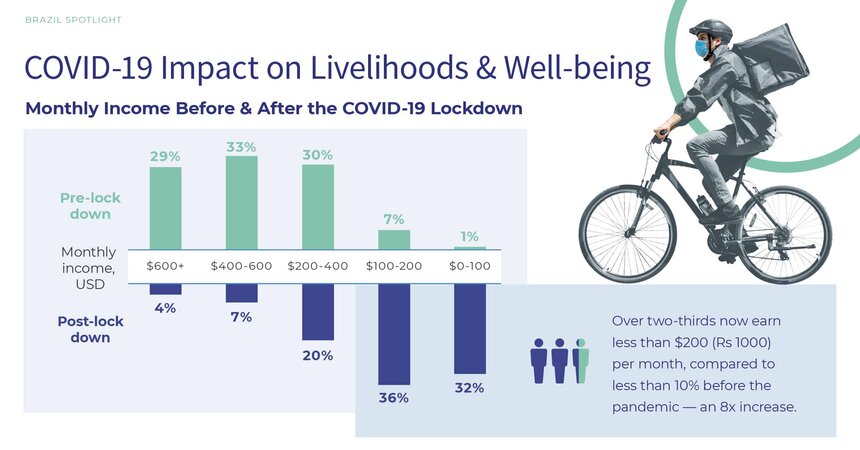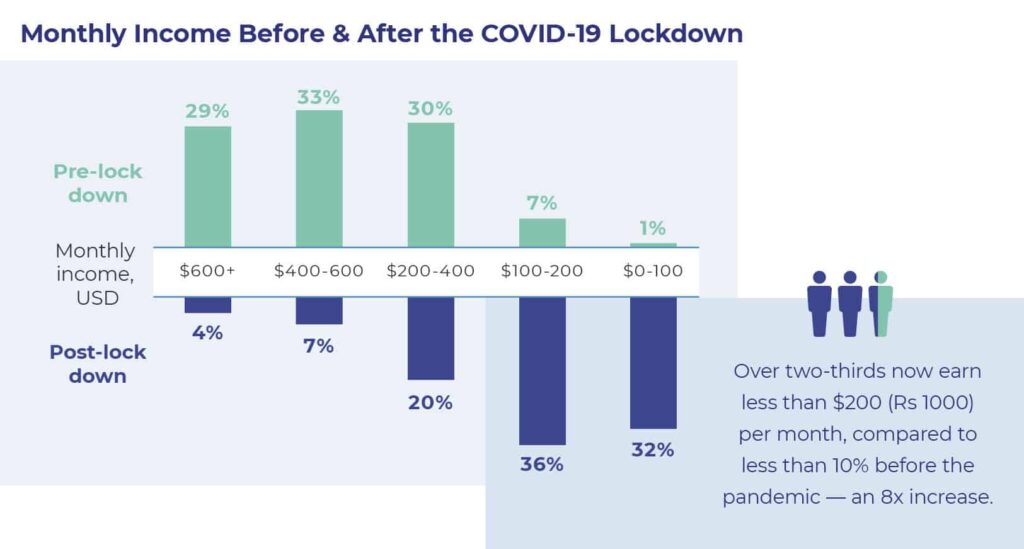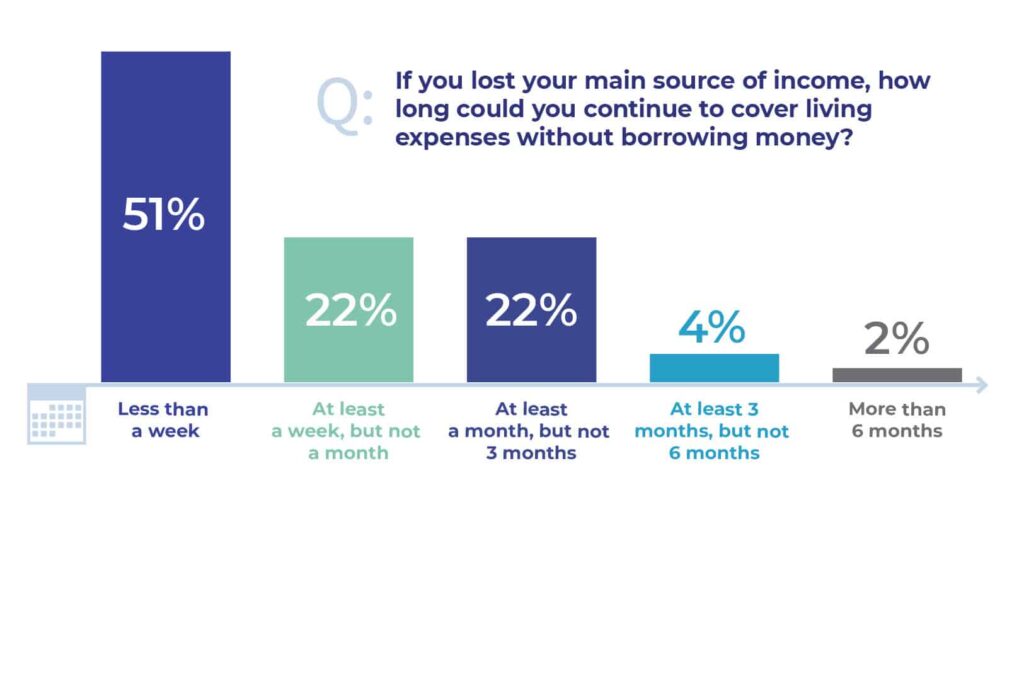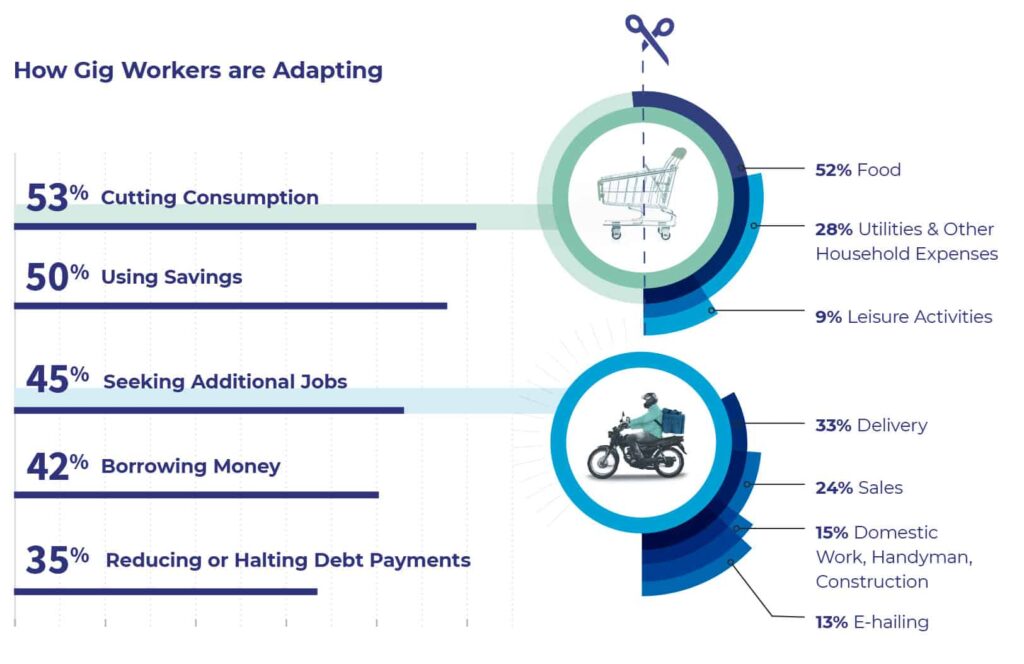
By Arjuna Costa & Stella Klemperer
Imagine a world where a Brazilian street vendor can easily transition to a new job in food delivery, with one-click financing for a motorbike and ready access to customers through a delivery service app. She doesn’t worry about her ability to work tomorrow because she has a small line of credit to fill her gas tank in the morning, with the loan deducted from her earnings at the end of the day. She doesn’t worry about her family going hungry if she gets sick or injured because she contributes a portion of her daily earnings to an insurance plan. And she is planning for the future, with opt-in contributions from her earnings set aside each workday to go toward rent, children’s school fees, and a rainy day fund.
This is a world where finance is intuitive and integrated into everyday lives—embedded in earnings, spending, goals, and life decisions. The convergence of finance with everyday life is particularly notable in the gig economy, where a historically underserved informal sector is increasingly connected to digital finance. In the U.S., gig platforms provide supplemental income and have helped build a new gig economy that offers greater flexibility and autonomy to workers. In emerging markets, e-hailing, delivery, and home services platforms bring informal workers online, helping formalize their livelihoods, improve their earning opportunities, and connect them to digital financial products like payments and credit. However, despite these obvious benefits, gig workers just don’t earn enough and remain financially vulnerable.
The COVID-19 pandemic has shown that gig workers cannot build a financial cushion and are vulnerable to sudden and drastic economic shocks. Those in direct service roles, like e-hailing, could no longer work during the lockdown and were hard hit financially while those who still had the ability to work faced serious health risks because they interacted directly with people and may not have the resources to protect themselves from the virus.
We had to listen.
Listening in a Time of Crisis
At Flourish, we have always grounded our work in a deep understanding of and empathy for the precarious financial lives of the populations we wish to serve, complementing our work in the field with primary research to elevate the voice of the consumer. Consequently, starting in May of this year, Flourish began tracking gig worker experiences across the globe to learn more about how they were faring during this crisis and to understand how fintechs could better serve them during this crisis and beyond. Called The Digital Hustle: Gig Worker Financial Lives Under Pressure, these country-specific studies are taking place in Brazil, India, Indonesia, South Africa, and the US. This week we are releasing the study results from Brazil Spotlight June 2020 in partnership with our portfolio company, MEI Facil, and research firm 60 Decibels.
As we conducted the Brazil survey, we heard stories from people like Rodrigo, an e-hailing driver who could not work because of the COVID-19 lockdown. Without work, he was forced to sell his car to repay bank debt. He transitioned to bicycle delivery work but struggles to make ends meet. He remains concerned about transmitting the virus to his elderly mother.
I only eat one meal a day. I’m very worried about my finances and my mother’s health. My only hope is that we receive the government emergency aid soon so we can at least eat. - Rodrigo, e-hailing driver
This hardship is real and widespread among Brazilian gig workers, but we also see glimmers of opportunity as we hear from workers about their financial lives, challenges, and aspirations. With our Brazil study, we learned several lessons about gig worker lives under the pressure of this crisis.
1: Gig Worker Financial Lives Have Been Severely Impacted
The research validated our hypothesis that the early days of the crisis have punished gig workers. We found that over two-thirds of Brazilian gig workers now earn less than $200 (Rs 1000) per month, compared to less than 10% before the pandemic—an 8x increase. Nearly 90% of gig workers lost income since the lockdown began in March 2020, and 78% reported a decline in quality of life, driven by decreased income and inability to pay expenses. More than 40% expressed a lack of hope—much higher than the 16% that our research partner 60 Decibels saw in other countries. While this is a devastating figure that may reflect the particularly challenging situation that Brazil is currently facing, this could suggest that even the smallest act might have an outsized positive impact.
2: Gig Workers Struggle to Weather the Ups and Downs
To cope with these sudden changes, 53% of gig workers are cutting consumption while 50% are using savings. Yet this population is still living on the edge—three months into the pandemic, half of gig workers reported that they could not cover expenses for a week without borrowing money if they lost their main source of income. Some have been particularly hard hit. The e-hailing sector was devastated, with 75% of respondents reporting a large loss in income. Surprisingly, even delivery workers—a mainstay of the emerging “no touch” economy—have struggled, with over half losing much of their income. Women have also struggled. E-hailing and delivery work is widely dominated by men, but when we looked more broadly at women in the informal sector, we found that nearly 80% of female primary household earners made less than $200 per month during lockdown—100 basis points lower than their male counterparts.
I work as a motorcycle taxi, and people are afraid of getting the virus, so they don’t take rides anymore.
3: In the Face of Hardship, the Gig Worker Population Is Adapting and Growing In the face of the hardship caused by this crisis, gig workers are finding new ways to earn an income. Forty-five percent are seeking additional work, with most going into delivery (33%) or selling goods (24%). The COVID-19 crisis may open the gig economy to more women, potentially increasing their resilience and income: across informal female workers who were not part of the digital gig economy prior to the lockdown, 10% of those seeking additional work are moving into app-based delivery.
In the face of the hardship caused by this crisis, gig workers are finding new ways to earn an income. Forty-five percent are seeking additional work, with most going into delivery (33%) or selling goods (24%). The COVID-19 crisis may open the gig economy to more women, potentially increasing their resilience and income: across informal female workers who were not part of the digital gig economy prior to the lockdown, 10% of those seeking additional work are moving into app-based delivery.
I lost my job as a beautician, so I signed up as an app driver.
Beyond gig workers seeking additional work, it is common in times of crisis to see growth in the informal economy as more people lose formal jobs or have earnings cut. This crisis is no different, as we have seen early signals that the number of gig workers is growing. In April this year, our portfolio company Neon, a challenger bank serving lower-income Brazilians, found that more than 40% of their customers are making up for lost wages through gig economy work or other income opportunities such as manufacturing and selling goods.
We have yet to see whether these early signals are sustained throughout and beyond the crisis, and there is more to learn. At Flourish, we are committed to listening to and sharing these stories as we follow gig workers over the coming months.
The Digital Hustle series will track how the lives of gig workers are evolving in Brazil and around the globe. We hope to achieve a greater understanding of gig workers’ financial lives and to explore the implications for fintechs and others who seek to establish trust and provide long-term solutions.
Additional Reading
The full Brazil Spotlight 2020 report is available here:
https://flourishventures.com/research/digitizing-the-corner-shop/brazil-spotlight/
Complete research findings are available on our interactive dashboard:
app.60decibels.com/flourish-gigeconomy2020
Reuters: Economic downturn pushes Brazilians into the informal economy:
Flourish perspectives: Making up for lost wages:
https://medium.com/flourish-perspectives/new-brazil-banking-survey-consumer-trends-shift-as-a-result-of-covid-19-outbreak-f1c7880d5704